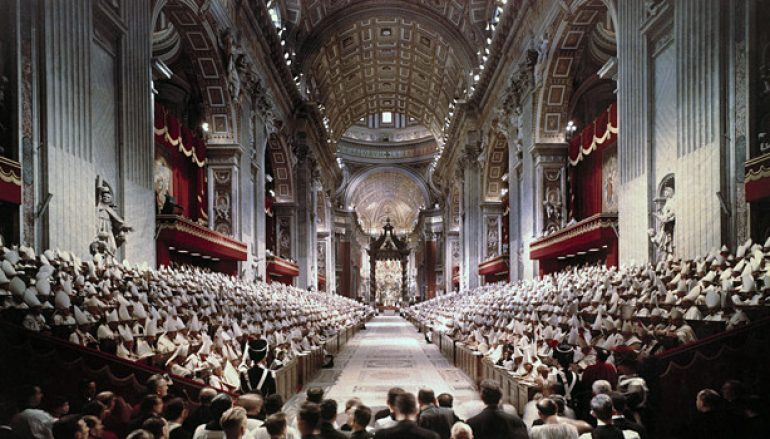3 Things Vatican II Did Not Teach

Patrick J. Buchanan: What Still Unites Us?
August 25, 2017
What You and I Can Do for the Future of America
August 25, 2017
By Fr. Richard Heilman, Roman Catholic Man, August 24, 2017
Pope Francis gave a talk yesterday that is making it’s way around the internet at lightning speed. The common title used by bloggers is “Pope invokes ‘magisterial authority’ to declare liturgy changes ‘irreversible.’”
I’m going to let this play out, and see what those who are greater experts than me (e.g., my friend, Fr. John Zuhlsdorf) has to say about this. But, my first reaction is, “Bring it!”
If the Pope wants to solidify Sacrosanctum Concilium, than let’s – FINALLY – get at what this document said, EXACTLY. And, what it DID NOT SAY.
It’s interesting that, in today’s Gospel, the only criteria Jesus points to when choosing Barnabas is “no duplicity.” The dictionary defines duplicity as “deceitfulness in speech or conduct, as byspeaking or actingin two different ways to different people concerning the same matter; double-dealing.” Hasn’t this“double-speak” or “ambiguity” to please everyone been the hallmark of the modern era?
Someone can correct me if I am wrong, but I do not believe a pope can invoke “magisterial authority” over poor interpretations of a council document. But, possibly, he can with the document itself.
That being said, let’s look at 3 things Sacrosanctum Concilium DID NOT say …
From an article by Matt Fradd:
In my experience, when someone ends a sentence with, “which is, after all, the spirit of Vatican II” or, “the spirit of Pope John XXIII”, they almost never know what they mean.
In fact the “spirit” they speak of is usually in direct conflict with with both Vatican II and John XXIII.
Sacrosanctum Concilium is the Vatican II document that dealt specifically with the reform of the liturgy.
In this post I thought I would (ridiculously briefly) look at three things the constitution did not say.
Ready? Let’s go!
1. ABOLISH LATIN IN THE LITURGY
In paragraph 54, it states: “In Masses which are celebrated with the people, a suitable place may be allotted to their mother tongue. This is to apply in the first place to the readings and to the Common Prayer. But also as local conditions may warrant, to those parts which pertain to the people.”
Yet it goes on to say, “Nevertheless, steps should be taken so that the faithful may also be able to say or to sing together in Latin those parts of the Ordinary of the Mass” (that is, the unchanging parts that we say every Sunday, such as the creed, the Gloria and the Lord’s Prayer) “which pertain to them.”
2. GIVE CONTEMPORARY MUSIC PRIDE OF PLACE IN THE LITURGY
In paragraph 116, the document states: “The Church acknowledges Gregorian Chant as specially suited to the Roman Liturgy. Therefore, other things being equal, it should be given pride of place in liturgical services.”
3. HAVE THE PRIEST FACE THE PEOPLE DURING THE LITURGY
Nowhere in the document does it say that Mass should be celebrated facing the people. Check for yourself. Founder and President of Ignatius Press, Fr. Joseph Fessio, says “Mass facing the people is a not requirement of Vatican II; it is not in the spirit of Vatican II; it is definitely not in the letter of Vatican II. It is something introduced in 1969.”
A CAVEAT
In pointing to these facts, I am not insinuating that a Mass celebrated entirely in the vernacular with contemporary music and a priest facing the congregation is inappropriate or not permitted. These things are permitted. They’re just not mandated by Vatican II—or any subsequent council for that matter.
So the next time someone tells you their Mass has really “embraced the spirit of Vatican II,” you should ask them, “oh terrific, so you have gregorian chant? The parishioners know how to say the order of the Mass in Latin? . . . ”
If they look at you strange and say ‘no,’ then you might (with a look of confusion) respond with, “then what is it you mean in saying that your liturgy has embraced the spirit of Vatican II?”
https://www.romancatholicman.com/3-things-vatican-ii-not-teach/




